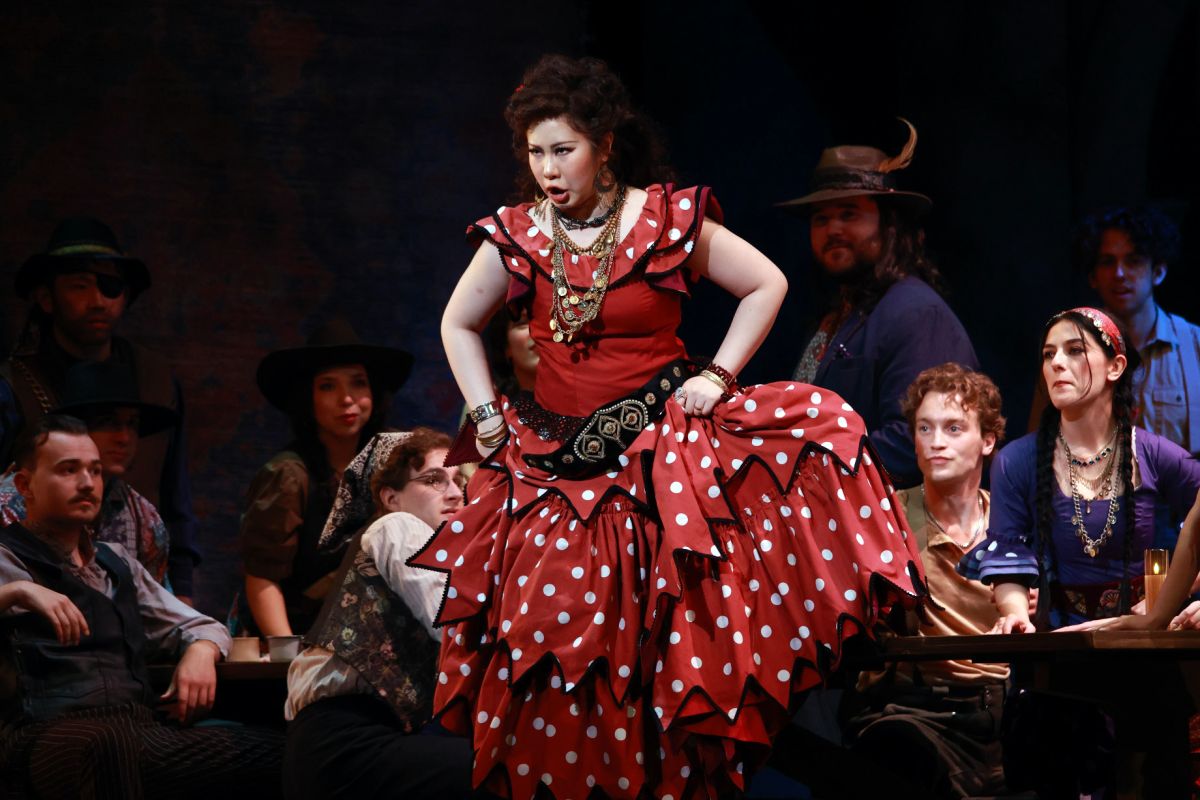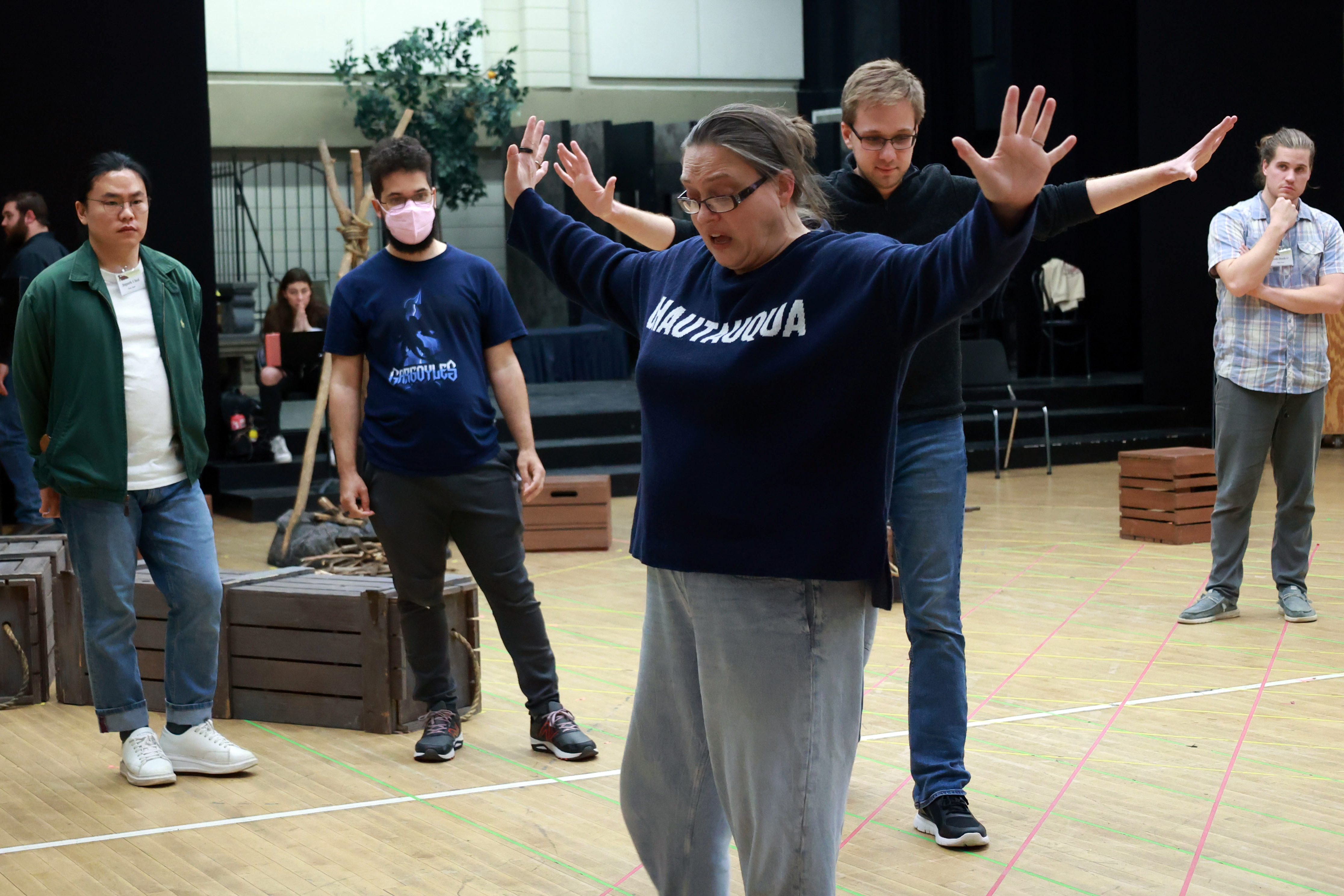Aaron Cain: I'm Aaron Cain for WFIU Arts. IU Jacobs School of Music Opera Theater presents Carmen by Georges Bizet. It'll be performed the weekend of April 18th and the weekend of April 25th at Musical Arts Center, 7:30 PM on Friday and Saturday nights. I recently had the chance to speak with the opera’s director, Keturah Stickann, in the WFIU studios.
Aaron Cain: One of the reasons I'm very excited to have a chance to talk with you, in particular, about this opera, and opera in general, is your expertise and your professional passion for two essential components of opera that are not always thought of as the most essential components of opera: the text, and movement.
Keturah Stickann: Yes.
Aaron Cain: So, the music, the singing, the acting, they're in no danger of being undervalued. And I guess you could file acting under movement. But your training and career as a dancer, and the importance you place on primary sources have both informed your approach to directing opera. You even host a podcast…
Keturah Stickann: I do. Well, I haven't in a couple of years, but, yes, I did. I did 63 episodes for that.
Aaron Cain: …and it's called Words First. You speak with librettists and dramaturgs and producers, all about the important role that text plays in opera. So, all that said, could you please tell me about your approach to directing this opera in particular, Carmen, and how movement and text are playing a part in that?
Keturah Stickann: Yeah. God. And they both intertwine so beautifully, because Bizet writes in dance themes. So much of the rhythms are dance rhythms that we feel throughout the piece. All you have to do is listen to it and you feel movement in your body. So, movement definitely is a huge part of the way that I approach this piece. I approach it from a…both a sensual movement—if we look at the Habanera, if we look at the Seguidilla—but also just the notion of fire. What I've told the students is fire and warrior status. There's war that's happening between Carmen and Don José, and between the Roma people and the outside world. And so, so much of the way that we move our bodies in this piece has to do with being warriors to uphold their way of life. Otherwise, my dance background played a huge part in just getting these students to move in particular ways as their characters. From a text point of view, I always start with the text. Text is paramount to me. And the music and the text in a perfect opera—I mean, Carmen gets pretty close—integrate with each other so beautifully, they're symbiotic. I start by reading the libretto and then I add the music in, and see how it changes my perception of what's being said. I talk through the text with these singers over and over and over again to get them to understand: what's a lie? What's truth? What are the different ways that we can color all of these pieces of text? Some of them seem so simple, but there's so many layers. There's layers of character and it's inherent in the text. And Louis Lohraseb, who is our conductor, he and I did some coachings with some individual singers, where he dealt with the music and I dealt with the text and the theatrical, and we both sort of dovetailed over each other. The students have been so receptive to everything that I have to say and everything that Louis has to say, and they've taken what I've given them with the text and really run with it.
Aaron Cain: This is not your first time bringing the story of Carmen to life.
Keturah Stickann: No.
Aaron Cain: You've directed at least one other production. You've also directed The Tragedy of Carmen.
Keturah Stickann: I have.
Aaron Cain: Is that the Peter Brook adaptation?
Keturah Stickann: That is, yes.
Aaron Cain: So, what do you find the most attractive and compelling about the story of Carmen?
Keturah Stickann: There's so much. I…um…this still happens. We can talk about it as being an old-fashioned story, but this is a thing that still happens. And so, I think…in fact, the other day, my fight choreographer said to me—we were watching the last duet that happens outside the bullring between José and Carmen—and he leaned over and he said, “this doesn't have to be a Roma woman and a Spanish guy, like, this could be anybody. This is anybody's horrible relationship gone absolutely wrong.” And I said, “you're right.” And so, the compelling part is that we can see ourselves in these characters. These characters are well drawn and, I think, the way we're presenting it, are well played. And so we can understand on a more visceral level how any one of these characters are feeling. People may not have been in abusive relationships or haven't been abusive themselves, but we certainly can feel the pain of a love that's gone seriously, seriously wrong.
Aaron Cain: Well, Keturah Stickann, thank you very much for speaking with me today.
Keturah Stickann: Thank you.
Aaron Cain: Keturah Stickann, the director of IU Jacobs School of Music Opera Theater’s production of Carmen by Georges Bizet, performed the weekend of April 18th and the weekend of April 25th at the Musical Arts Center, 7:30 PM on Friday and Saturday nights. More information at operaballet.indiana.edu. For WFIU arts, I'm Aaron Cain.








